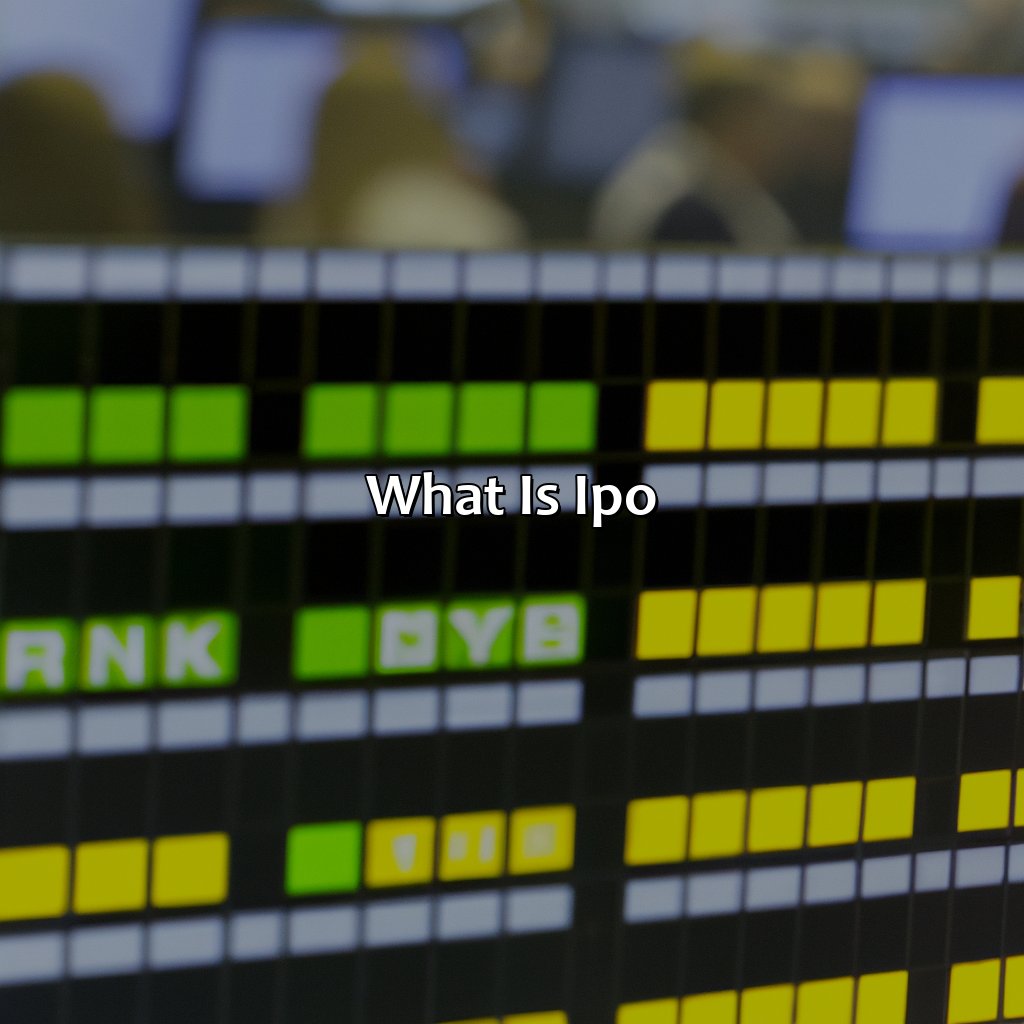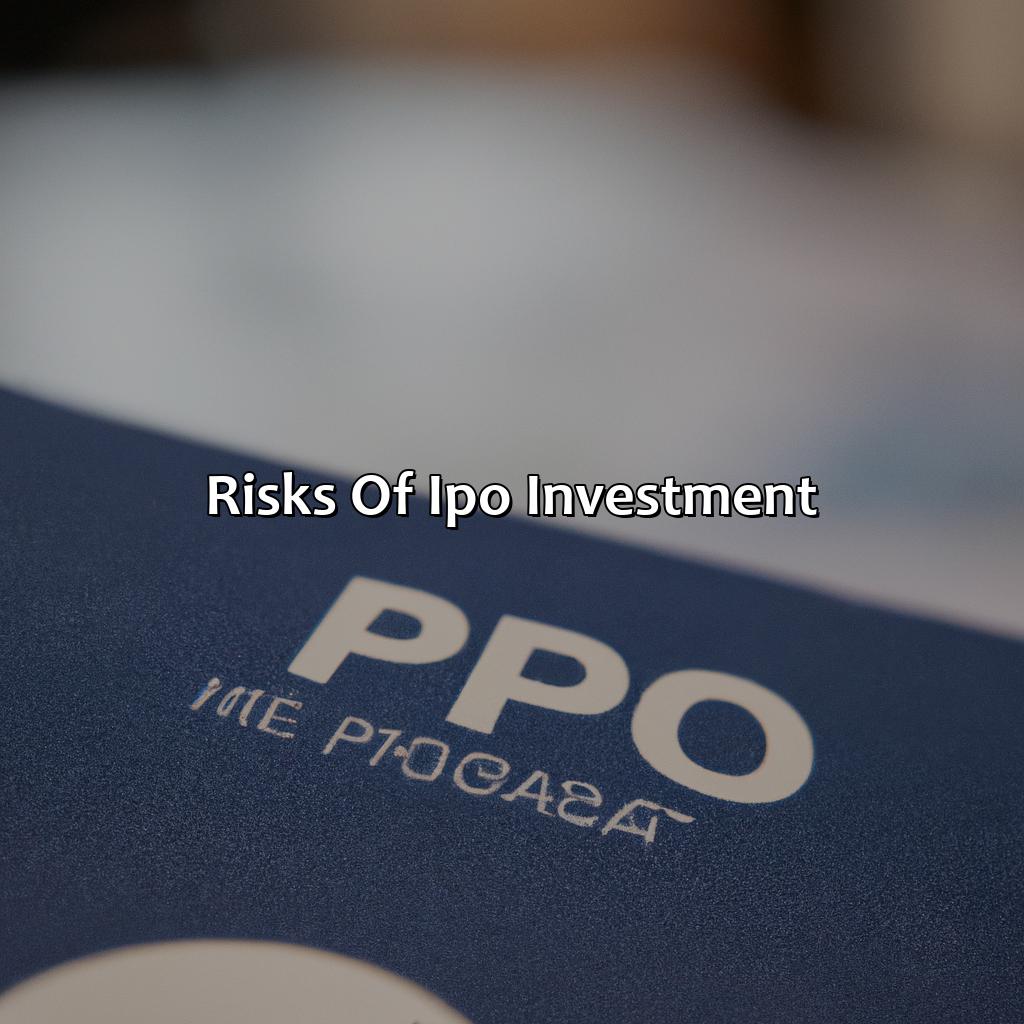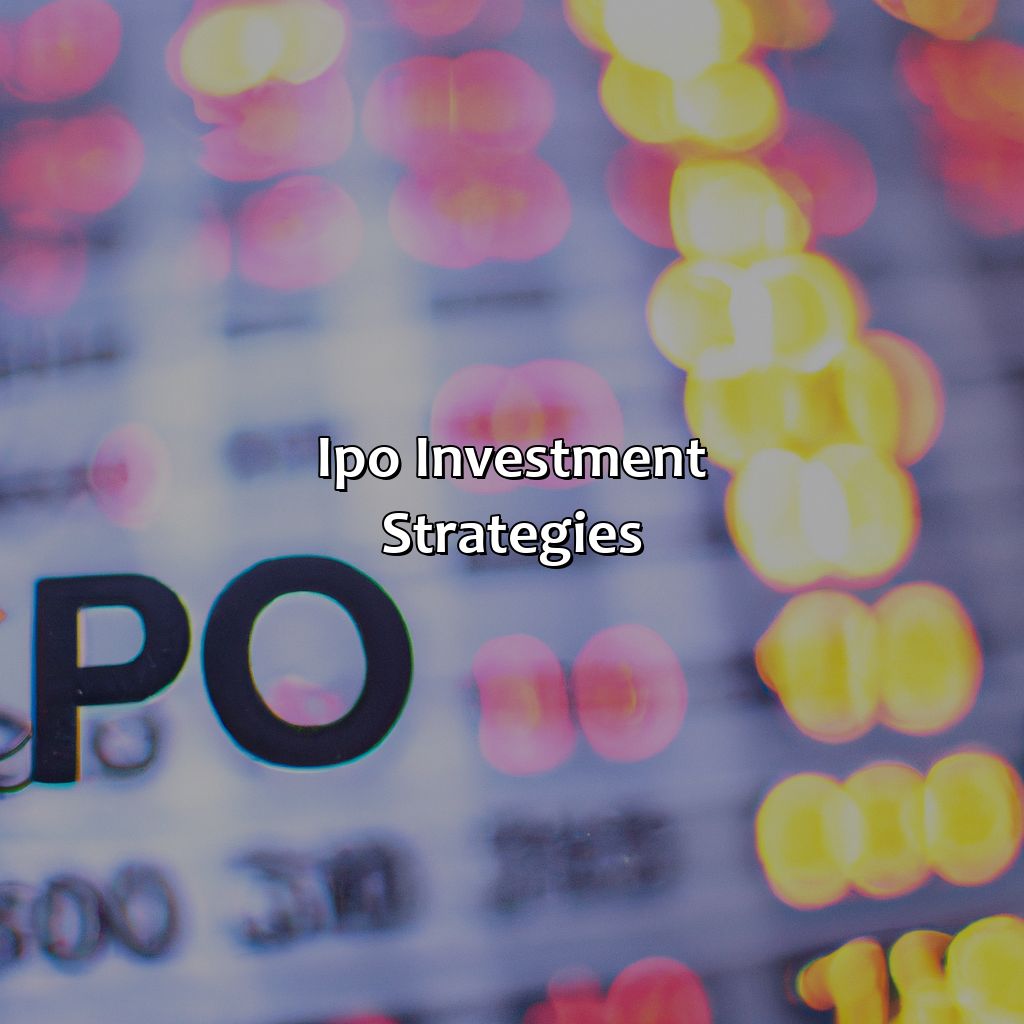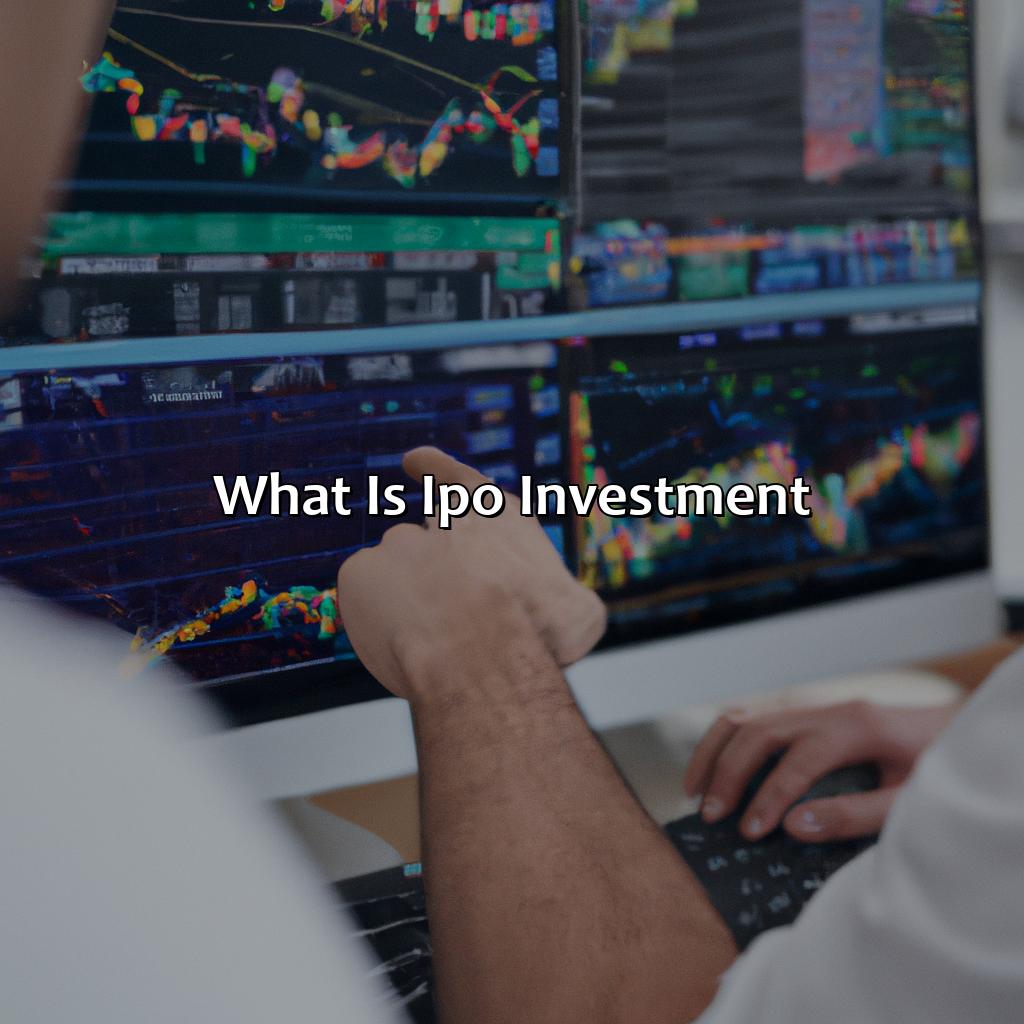What Is Ipo Investment?
Key Takeaway:
- IPO, or initial public offering, is the process by which a private company offers its shares to the public for the first time, allowing investors to purchase a stake in the company.
- Investing in an IPO can potentially provide high returns, as the price of the shares may increase significantly after the company goes public. It also offers access to new markets and enhances the company’s credibility.
- However, investing in an IPO can be risky due to market volatility, uncertain performance, and the costly and time-consuming process. It is important to research the company, assess the offer price, and time the investment carefully.
Considering an IPO investment? You’re not alone. With the potential for high returns and access to the latest offerings, it’s an attractive investment option. But just what is IPO investment and is it right for you? Find out in our comprehensive guide.
What is IPO?
Understand IPO investment? Know what it is first! IPO stands for Initial Public Offering. To comprehend it, you must learn what it is and how it works. Here’s a quick breakdown of both parts.

Image credits: retiregenz.com by Joel Arnold
Definition of IPO
Initial Public Offering (IPO) is the process by which a private company offers its shares to the public for the first time, allowing investors to buy them. In essence, an IPO is the first step for companies that want to go public and raise capital from a wider range of investors. Companies may choose to go public through an IPO to increase their visibility, raise funds for expansion or pay off debt and provide early investors with liquidity.
During an IPO, shares in the company are sold to institutional and individual investors, who can then trade these shares on a stock exchange. The price of the shares is generally determined through an auction process or through discussions between the company and underwriters before they start trading publicly.
Investing in an IPO can be risky as newly listed companies may have limited track records and unproven business models. However, if successful, investing in an IPO can offer significant returns as share prices often surge on the first day of trading.
Some famous examples of successful IPOs are Facebook (2012), Alibaba (2014), and Uber (2019). These companies raised billions of dollars through their IPOs and became some of the most valuable companies in the world.
Get ready for the rollercoaster ride of IPOs, it’s like investing in a stock but with the added thrill of uncertainty and hyped-up expectations.
How IPO Works
Initial Public Offering (IPO) is the process of a private company going public by offering its shares to the general public. The company hires investment banks to underwrite and sell these shares to potential investors in the stock market.
During an IPO, the underwriters determine the appropriate price range for the shares based on various factors such as financial performance, industry trends and investor demand. The company and underwriters then set a final price for the shares, which is usually higher than the estimated range.
Once shares are available for purchase, investors can buy them through their brokerage accounts. On the day of the initial public offering, trading begins on stock exchanges with buying and selling of these newly issued shares taking place among traders.
It’s important to note that investing in an IPO carries risk because it is uncertain how well the company will do in the future. Investors should carefully research and analyze a company before making any investment decisions.
True story: In 2019, ride-hailing giant Uber made headlines when it went public with high expectations but faced a disappointing debut due to concerns about its profitability and regulatory issues. It serves as a reminder that even highly anticipated IPOs come with risks.
IPO investments are like blind dates – sometimes you hit the jackpot, and other times you end up with a dud.
Benefits of IPO Investment
Gain insights on the perks of IPO investment! Boost your portfolio with possible high returns. Open up your investments to new markets. Increase credibility by participating in IPOs. Reap the benefits!

Image credits: retiregenz.com by Harry Jones
Potential for High Returns
Investing in an Initial Public Offering (IPO) can offer tremendous opportunities for capital gains. IPO investment presents a unique opportunity to buy into a company’s shares before they are available to the general public. Thus, the potential for high returns is vast, as share prices tend to rise quickly once they are released into the market.
Furthermore, with IPO investments, investors can capitalize on the hype surrounding newly public companies, which often translates to higher stock valuations. Additionally, seasoned investors may find it easier to predict future price increases and maximize their returns.
Moreover, investing in an IPO affords investors the chance to support up-and-coming businesses and participate in their growth story. This allows investors a unique opportunity to feel connected to and invest in emerging industries or new technologies that have the potential for high returns without having prior trading history.
In 2019, Uber went live with its IPO after years of anticipation. However, when markets opened on its first day of trading, shares plummeted nearly 8 percent more than expected leading up to the big day. Nevertheless, after a few weeks of restructuring and realignment by CEO Dara Khosrowshahi, Uber made significant improvements that ultimately produced impressive capital gains by late 2020; returning roughly 34% since January of that year till date.
Get ready to take your investment game to the next level with IPOs – it’s like discovering a secret room filled with new markets to conquer.
Access to New Markets
Investors have access to untapped markets with IPO investment, leading to an increase in customer base and revenue generation for the company. This provides a chance for expanding their horizons of business operations, which also encourages economic growth.
IPO investment helps companies expand into unexplored territories while gaining access to new customers and stakeholders who are passionate about their products or services. Furthermore, the listing provides additional financial resources necessary for taking advantage of these new markets’ opportunities.
With increased exposure through IPO investment, companies can set themselves apart from other competitors and improve their overall market position. It also offers better brand recognition and adaptable to ever-changing market trends by introducing novel solutions/products/services.
Pro Tip: Conduct extensive research focusing on market analysis before investing in any IPO. Take help from a financial advisor or a seasoned professional who will evaluate the investment’s risks and rewards based on your objectives.
Nothing screams legitimacy like investing in a company that’s willing to put itself on the public chopping block.
Enhanced Credibility
Through an IPO investment, a company’s credibility can be enhanced, allowing the public to view it as a reputable and trustworthy organization. This improved image not only attracts potential investors but also encourages customer loyalty and employee satisfaction.
Investing in an IPO can also provide opportunities for increased financial growth for not only the company but also its stakeholders. The influx of capital gained from going public can be used for expansion, research and development or debt reduction. Moreover, the company has access to more resources, such as experienced board members and industry experts, which can help drive growth and improve performance.
Furthermore, by going through the rigorous process of an IPO, companies must publicly disclose their financial information to gain investor confidence. This transparency improves accountability and governance within the company.
A notable example is Alibaba’s 2014 IPO on the New York Stock Exchange (NYSE) where they raised a record-breaking $25 billion. Their successful IPO has helped solidify their position as a leading global e-commerce giant.
Prepare to ride the roller coaster of high-risk and high-reward as you consider IPO investments – it’s like playing a game of chance with your money, but with more bells and whistles.
Risks of IPO Investment
To comprehend the risks of IPO investment, you require knowledge of the market’s volatility, unpredictable results, and the costly and lengthy procedure that comes with it. We’ll investigate these subsections in depth in this section. Thus, giving you a thorough understanding of the potential difficulties of IPO investment.

Image credits: retiregenz.com by Adam Woodhock
Market Volatility
Investing in an IPO can be risky due to the unpredictability of the market’s ever-changing conditions. The instability of prices and investor sentiment towards new stocks can create a volatile environment for IPOs. This volatility may lead to significant price swings that could harm investors’ financial health if they are not cautious.
Moreover, market fluctuations affect investors’ emotions and decision-making abilities, making it challenging to determine when it is appropriate to exit or enter a trade. The lack of stability in the IPO market necessitates extensive research and attention from investors before undertaking any investment decisions.
It is worth noting that market volatility does not imply that investing in an IPO is always going to be disadvantageous. The potential for profit makes it an appealing choice for several novice investors looking for high returns. However, interested parties must balance risk with potential gains and conduct extensive research before putting their funds on the line, erring on the side of caution.
Don’t let fear prevent you from exploring lucrative investment options like IPOs because with enough research and guidance, successful investment ventures are possible!
Putting your money in an IPO is like playing a game of musical chairs, except the music never stops and the chairs keep changing sizes.
Uncertain Performance
The dynamic nature of IPO investment leads to fluctuating and volatile performance. Share prices often rise and fall due to market behaviour, making it difficult to predict performance. IPO investors should be mindful of this risk when making investment decisions.
Stock prices can face uncertainties due to market reactions, changes in the economy, regulatory standards or even negative press coverage affecting company reputation and stock prices. These factors contribute to high volatility in share prices which makes it hard for investors to predict performance with certainty.
IPO investments may also face risks due to over-hyping of the company’s potential performance during its Initial Public Offering period, leading to unrealistic expectations among investors. Furthermore, new companies often lack a robust history of financial data about their public performance, adding additional unpredictability concerning growth trends.
The disappointing IPO cancellation by WeWork in September 2019 is an example of an uncertain IPO investment outcome. The company had initially anticipated raising an estimated $47bn valuation but experienced poor reception from industry experts who were wary of its business model and management style. Its planned IPO was ultimately abandoned, causing significant reputational damage to the company as well as severe financial losses for analysts and stakeholders.
Who needs a rollercoaster when you can experience the thrill of a costly and time-consuming IPO investment process?
Costly and Time-Consuming Process
Investing in an IPO can be a financially and temporally demanding process. The roadshow and underwriting process require high-cost investments, expert legal advice, and time-consuming due diligence.
Furthermore, given high demand from retail investors, there is often a rush to secure shares, leading to inflated initial prices. Additionally, the market for IPOs is especially volatile, with substantial swings in valuations even within short periods.
As such, investing in an IPO requires thorough research into both the company going public as well as broader market trends. Ensuring that you have access to reputable information sources and expert advice can help reduce risk and maximize potential returns.
Don’t miss out on potential opportunities but proceed with caution. Be informed when making any investment decisions.
Why take risks with IPO investments when you can just invest in a Magic 8-Ball?
IPO Investment Strategies
Research it! Get to know the company.
Assess the offer price.
Time the investment.
Understand how to invest in an IPO like a pro by mastering these three strategies.
Explore and discover the tips and tricks.
Make wise investments!

Image credits: retiregenz.com by Joel Arnold
Researching the Company
Investigating the Company
Before making IPO investments, thorough investigation of the issuing company and its financial status is crucial. Analyzing their business model and evaluating their competency in the market is essential. Studying key financial ratios, such as price-to-earnings ratio, earnings per share, revenue growth rate, net profit margin and so on can help determine if the company is financially stable.
Additional Information
It is imperative to investigate various sources of information that can provide insight into a company’s past performance and future prospects. Assessing news releases, management interviews, analyst reports and industry publications can help investors understand the health of the business.
Call-to-Action
Given that successful IPOs are rare opportunities to make significant profits for investors, it’s essential to devote ample time researching potential companies before investing in them. Don’t miss out on a good investment opportunity by failing to do proper due diligence.
Don’t be like a blind bidder at an auction, do your research before assessing the offer price for an IPO investment.
Assessing the Offer Price
Evaluating the IPO Share Price
The initial share price of an IPO is a critical factor that shapes investor decision-making. To determine whether the price being offered is fair, potential investors will usually scrutinize the company’s financial history and consider various factors such as market trends, previous IPOs in the same industry, and future growth prospects. With this information at hand, they can make informed decisions on whether to invest or not.
Investors must also consider how much they are willing to pay for the shares since prices may fluctuate rapidly after the IPO launch date. Additionally, investors may need to assess how much demand there is for shares and weigh this against their perceived value based on other indicators.
To avoid losing out on potential opportunities caused by delayed or rushed investment decisions during an IPO, investors should carefully assess all available information before making any decisions. This includes economics news and public perception surrounding the company ahead of time. Why wait for the perfect timing to invest in an IPO when you can just throw caution to the wind and hope for the best?
Timing the Investment
Identifying the Optimal Time to Invest in IPO
Determining when to invest in an initial public offering (IPO) demands astute timing, since it can generate substantial returns or inflate investment risks. Prior to investing, research company financials, growth, and market conditions closely.
By analyzing financial projections and comparing them with industry expectations as well as looking at current financial performance, investors can determine if an IPO is worth investing in.
However, investing too early or too late could lead to unfavorable circumstances. In certain cases, waiting a few weeks following the IPO may enable you to analyze how the firm is performing before making a final conclusion on whether or not to invest.
Several investors apply similar strategies by monitoring sell-side analysts recommendations around three months post-IPO before buying shares.
For instance, Snap Inc., an American camera and social media corporation developed Snapchat, went public at $17 per share in 2017. The stock increase resulted in some early IPO investors losing money after holding on to their shares for more than two years. In contrast, those who sold in Snap Inc.’s stock after feverish trading made significant profits soon after it went public.
Five Facts About IPO Investment:
- ✅ IPO stands for Initial Public Offering, which is the process through which a company goes public and sells its shares to the general public for the first time. (Source: Investopedia)
- ✅ IPO investment can be a high-risk, high-reward strategy, as the price of the stock can fluctuate significantly in the days and weeks following the offering. (Source: Forbes)
- ✅ IPOs are typically underwritten by investment banks, who help the company determine the appropriate price range for the offering and find buyers for the shares. (Source: The Balance)
- ✅ Investors can participate in an IPO through a brokerage firm, but may need to meet certain eligibility requirements, such as a minimum investment amount or net worth. (Source: NerdWallet)
- ✅ Popular examples of recent IPOs include companies such as Airbnb, DoorDash, and Snowflake, which all experienced significant price increases in their first days of trading. (Source: CNBC)
FAQs about What Is Ipo Investment?
What is IPO investment?
IPO stands for Initial Public Offering, which is the process by which a private company goes public by offering its shares to the public. IPO investment refers to the act of investing in a company that is in the process of going public.
How do I invest in an IPO?
Investing in an IPO typically requires the investor to have a brokerage account and be able to purchase shares at the IPO price, which is typically set by the underwriters. In some cases, IPOs may also be available to buy through crowdfunding platforms or an online investment platform.
What are the risks of investing in an IPO?
There are several risks associated with investing in an IPO, such as market volatility, unpredictable demand, and the lack of a historical track record. It is important for investors to carefully evaluate the company’s financials, management team, and industry before making an investment.
What are the potential benefits of investing in an IPO?
Investing in an IPO can potentially provide high returns if the company performs well in the public markets. Additionally, investing in an IPO can allow for increased diversification in an investor’s portfolio.
How does the IPO process work?
The IPO process typically involves the company hiring an investment bank or underwriter to manage the offering. The underwriter will assist with setting the IPO price, registering the securities with the SEC, and distributing the shares to the public. After the IPO, the shares will begin trading on a stock exchange.
What factors should I consider before investing in an IPO?
Before investing in an IPO, investors should consider the company’s financials, including revenue growth and profitability, the management team and their experience, the industry and competition, and any regulatory issues that may impact the company’s operations.
